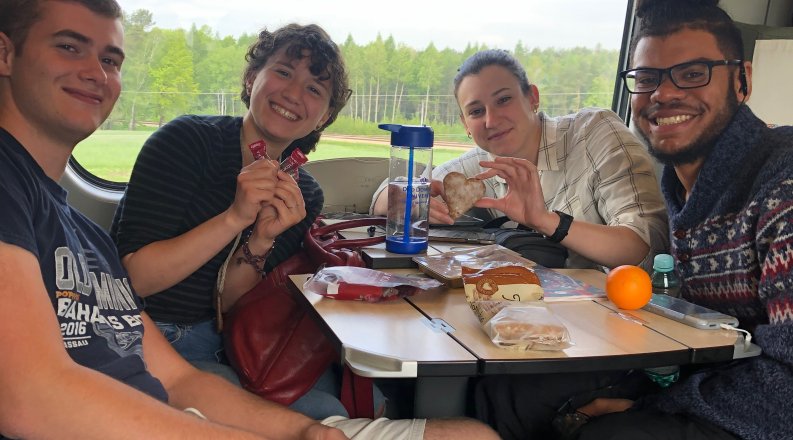By Paul Currant
At the April 10th Monday Meet Ups campus-wide book read, a panel of faculty, administrators and two graduate students explored ways of helping students to think globally. Everyone stressed the seriousness of today’s global problems and ODU’s responsibility to ensure our students become globally cognizant. Several panelists discussed the need to embed internationalization in the curriculum along with a sense of urgency about today’s “wicked problems.” Including international authors on one’s syllabus, exploring the Suny COIL program (Collaborative Online International Learning) that pairs US-based faculty with international faculty abroad to develop three-to-six week units for students to work collaboratively, and developing more international leadership minors were a few of the suggestions the panel offered to help our students better understand global citizenry. The role of study abroad was of course a major focus of the discussion.
There was, as there usually is, a consensus among the panel that spending time in another culture is a great way to understand global citizenship and develop personal qualities like independence and resourcefulness. Study abroad is an invaluable leg up professionally as well.
At the same time, student resistance is also well documented, particularly when it comes to longer term programs. There is a worry that a semester off campus will result in falling behind academically, will mean that connections with friends are lost, and will result in missing out on the cultural and social activities on the one’s campus. Sometimes specialized programs for advanced students don’t allow for the flexibility that semester-long study abroad requires, meaning some of the very best students miss out on the opportunity entirely. On top of that, according to recent statistics, 34% of students do not enjoy their study abroad experience, perhaps indicating that colleges and universities are not preparing students for the difficulties and loneliness that often occurs, especially early-on in the first few weeks of a study abroad program before students have made friends or adjusted to different foods, cultural expectations, and the sheer distance from home. Students need to understand that part of the critical experiential learning encounter often involves overcoming hardship and having more time for self-reflection.
As if that wasn’t enough, there is also the reality that a semester abroad can cost $12-14k and may mean that the student will have to halt the part-time job that makes attending universities like ODU possible.
Unravelling all these challenges takes time and patience, but it can be done – at least for some of our ODU students. The fact is, a semester abroad is ten times longer than the average faculty led program and yet only costs three times the price. The value is clear. Furthermore, tuition, housing, and food for a semester in Norfolk is not far off the $12-14k price point for a semester at one of our many global partner universities. Most importantly, research that shows that students who have studied abroad get into better graduate schools, have better starting salaries when they graduate, and make more money in their careers. They will probably enjoy their jobs more too. Extolling this message to our ODU students is an essential part of increasing the numbers of students who study abroad and who enjoy the multiple benefits of experiential learning.
It is incumbent on globally-minded faculty and staff and especially everyone at ODU’s Center for Global Engagement to get this message across in FY24. We have the infrastructure in place, excellent partnership support, supportive faculty and colleges, and the staff to make it happen. Semester abroad numbers are already rising, and we are convinced the more the message gets out the more students will see the value of experiential learning, grab the opportunity, and profit from the benefits for the rest of their lives.
As the English proverb goes, “The worth of a thing is what it will bring.”



